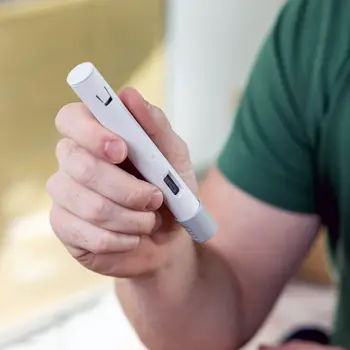Practical Fasting Tips for Beginners
What is Intermittent Fasting (IF)?
Intermittent fasting is a popular alternative to traditional diets and it involves eating and fasting according to a predefined schedule.
Also known as time-restricted eating (TRE), this dietary approach has been proven to aid weight loss, control blood sugar levels, and decrease the risk of several diseases.
Unlike caloric restriction or fad diets that promote disordered eating, intermittent fasting does not require you to make massive changes to your diet. By making a few adjustments to your daily schedule, you can enjoy the foods you love and still reap some health benefits.
Intermittent fasting for weight loss is generally safe, but it may not be suitable for everyone.
People who may want to explore alternative dietary approaches to fasting include children, pregnant women, people with eating disorders, the elderly, and those who are underweight.
Get prescription weight loss medication online.
Find out if you're eligible for GLP-1s, and get started on your weight loss journey for as low as $75/month.


Key Point: Can Diabetics Do Intermittent Fasting?
Because diabetics need medication and insulin to manage their blood sugar, it can drop dangerously low when they fast. For this reason, there’s a misconception that people with diabetes cannot fast.
People with both type 1 and type 2 diabetes can safely fast with guidance from their doctor. However, it is more challenging for people with type 1 diabetes to fast as they’re dependent on insulin.
One study showed that Ramadan-style fasting — fasting without food or drink from dawn to sunset — can be done safely by people with uncomplicated type 1 diabetes, provided they monitor their glucose levels.
People with type 2 diabetes may have an easier time fasting than type 1 diabetics. Studies have shown that type 2 diabetes can even be reversed and prevented with fasting.
Choosing foods that are absorbed more slowly — for example, low GI foods like oats, can help diabetics fast more easily.
Fasting types: Choose the right fasting method
Some fasting methods may be more suitable for your lifestyle than others. Consulting with a doctor and dietician can help you determine what works best for you.
Certain fasting methods have longer fasting periods than others. So start with the 12-hour fast, and work your way up to the longer periods if they’ll help you achieve your goals.
No matter which fasting method you choose, you’ll likely be skipping meals during intermittent fasting. So consume enough nutrient-dense foods during your eating window.
Check out our article on intermittent fasting to learn more about fasting types.
Does Intermittent Fasting Work for Weight Loss?
Intermittent fasting has been proven to work for weight loss, although studies show that the participant drop-out rates are higher with intermittent fasting — specifically with alternate-day fasting — than for participants who rely on calorie restriction.
So, even though intermittent fasting is an effective way to lose weight, individuals need to remain consistent and follow professional tips to ensure success.
Other factors are also involved, such as exercise. One study showed that people who combined IF with exercise lost more weight than those who did IF alone.
However, even though you may see better weight loss results by combining intermittent fasting with exercise, there are several things you need to consider before you start hitting the gym on an empty stomach.
Ready to achieve your weight loss goals?
Shed pounds with GLP-1 medication prescribed online by licensed healthcare providers for as low as $75/month.


Key Point: Are You Allowed to Eat During Intermittent Fasting?
During a fasting period, you’re not allowed to eat anything with calories as this will break your fast. But you can consume water or calorie-free beverages like herbal teas and black coffee.
Only those who are dry fasting (not consuming any food or liquids during their fasting periods) should refrain from beverages, too.
Tips for Successful Fasting as a Beginner
Whether you’re fasting to lose weight, manage health conditions like diabetes and high blood pressure, or improve your metabolic health, you need to stick to it to see results.
Prolonged periods of fasting may not be suitable for everyone, especially people with diabetes.
We advise that you consult a healthcare professional before you start with any new diet plan, including intermittent fasting.
Start slowly
Make fasting a part of your health journey — it’s not a race to get to the finish line.
Work with professionals to determine your new eating schedule and opt for shorter fasting periods when you begin.
It may take your body some time to adjust to your new eating pattern. Hunger, fatigue, irritability, headaches, and concentration difficulties are some of the effects you may feel when your insulin levels start to drop.
An easy way to begin is with the 12-hour overnight fast — you’ll simply delay breakfast in this case.
Stay hydrated
Daily water intake is important – especially during fasting.
The recommended amount of water required for men is 15.5 cups per day, while women only need 11.5 cups. But keep in mind that water is found in fruits and vegetables as well as other beverages. So if you drink herbal teas or black coffee throughout the day, these contribute to the count.
It might be tricky to drink enough water if you’re dry fasting. One study examined the consumption of water during the fasting month of Ramadan and found that participants who were dry fasting from dawn to sunset did not meet the daily recommended water intake.
Whether you’re drinking during your fasting window or you’re practicing dry fasting, you can stay hydrated by not skimping on fruits and vegetables, and ensuring you drink enough water-based beverages.
Avoid binge eating
Going 12 or more hours without food can make it difficult to exercise self-control when your eating window arrives.
The American Heart Association recommends breaking your fast with a date — a custom followed by Muslims for centuries — as it is an excellent source of fiber and nutrients.
Fasting diabetics should limit their dates to one.
Planning meals ahead of time can also prevent you from overdoing it when you have your evening meal.
Ensure your meal comprises lots of vegetables, lean protein, healthy fats, and fruits. A healthy diet will help maximize your fasting efforts.
Keep yourself occupied
Many people report that they find it easier to fast if they are kept busy with work and don’t have time to focus on how hungry they are.
Make sure your schedule for fasting days is packed with activities that help you stay occupied and divert your attention from food.
Some of these activities may include:
Working on personal and professional projects
Engaging in a hobby
Cleaning and organizing your home
Going for a walk or hitting the gym for some low-intensity exercise
Playing games, reading, or solving puzzles
Try not to watch too many videos while you’re fasting as many of them may contain tempting food imagery.
Remember, you eat with eyes, and visually appealing food can stimulate your appetite for them, which makes it harder to eat mindfully later on.
Be flexible
When you first start fasting, it may be difficult to stick to your eating schedule. Only eating during certain hours may leave you feeling hungry constantly, so take a break when you need to.
If, for example, you’re doing alternate-day fasting and you usually skip breakfast, it’s okay to take a break if you’ve been invited to a breakfast buffet that happens to fall on the day you’re scheduled to fast.
Whether you’re intermittently fasting for weight loss, to decrease insulin resistance, or to manage your blood pressure, it’s important to stick to your plan. Sometimes, in order to reach your long-term goals, you have to take a break now and then.
Don’t overexert yourself
It goes without saying: decreased calorie intake will leave you with less readily available energy. Time-restricted eating can make you feel lethargic and fatigued, especially when you’re new to it.
So don’t try to run any marathons while you’re fasting and be sure to get enough good quality sleep at night.
Add flavor without additional calories
Don’t try to overcompensate for skipping meals during your fasting period.
Use aromatics like garlic and onions, generous low-calorie seasonings, fresh herbs, and a pinch of salt to prepare more satisfying dishes while keeping the calories low.
Adding acidity to your foods with lemon and vinegar also helps create flavorful dishes that won’t add calories that hamper your weight loss efforts.
Have a good support system
No matter which fasting method you choose, intermittent fasting is not easy — especially when you start your journey.
Encourage your family and friends to participate. Following a time-restricted eating plan may be easier if you’re not doing it alone.
Your doctor, registered dietician, and personal trainer can also provide excellent professional support to help you reach your fasting goals.
Common Fasting Mistakes to Avoid
Now that you know which intermittent fasting tips you should be following when you start your health journey, you also need to know which pitfalls to avoid.
Here are some common mistakes that can sabotage your fasting efforts.
Overeating
If you overeat during your eating window, you can’t achieve a caloric deficit, as this deficit won’t happen when you consume more calories than you use. This, in turn, makes it very difficult to lose weight.
Eating slower, drinking enough water, breaking your fast with a date, and planning nutrient-dense meals in advance are some things you can do to prevent yourself from overeating after a fasting period.
Extending fasting periods too soon
You can only reap the health benefits of fasting if you are able to stick to it, and extending your fasting period too soon may cause you to give up.
Start gradually and avoid extreme fasting methods in the beginning. If you feel your eating window is too short, gradually extend it until you feel ready to stick to your original fasting schedule.
Using fasting as an excuse to eat unhealthy foods
Some people may be under the impression that going without food for 12 hours or more makes it okay to pile their plates with whatever they like during their eating window — this, however, will undo all their hard work.
In addition, if you consume calorie-heavy, processed foods in the evening and skimp on vegetables, you’ll increase your risk of developing conditions like high cholesterol and heart disease.
A diet rich in fiber and low in saturated fat can lower your risk for several health conditions — so have treats in moderation, even when you’re intermittently fasting.
Don’t Give Up: Practice Patience and Have a Good Mindset
With the right attitude, planning, and support, you have a greater chance of achieving your health goals with intermittent fasting.
If you have tried counting calories or following trendy diets with little to no success, fasting might be a sustainable option for you.
Here are some more tips that will help keep you focused on the end goal:
Set reasonable, achievable goals
Document your progress with daily journal entries
Plan your meals ahead of time
Manage your stress levels
Get in Touch with a Healthcare Professional to Learn More About Fasting
Are you wondering whether intermittent fasting is the right choice for you? Maybe you’re diabetic or prediabetic and want to make a lifestyle change that can potentially reverse this — LifeMD can help.
We provide online access to doctors and valuable resources about fasting, health, and weight management. Book your appointment today to get started.













